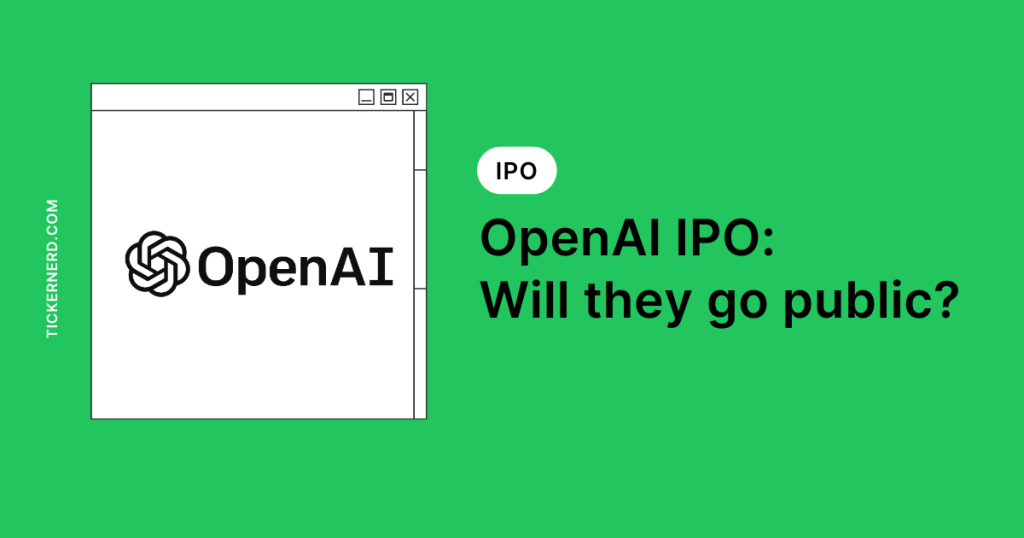Overview:
- Co-founder Sam Altman when asked about a potential OpenAI IPO said “When we develop super-intelligence, we are likely to make some decisions most investors would look at very strangely, I don’t want to be sued by … public market or Wall Street so no, not that interested.”
- OpenAI has become a major player in AI, known for its large-scale AI model ChatGPT and its potential applications across various industries. They've received significant funding, with a valuation of up around $29 billion.
- The company has not yet turned a profit but anticipates a billion in revenue by 2024. Microsoft's $10 billion investment is tied to future profits, with the tech giant to receive 75% of profits until their investment is recouped.
What you need to know about OpenAI
It’s still unclear whether AI will take over the world.
But one thing is for certain – OpenAI will go down as one of the if not THE most impactful company in human history.
Let’s breakdown why the company is such a big deal:
- First, it’s behind ChatGPT. A large-scale AI model that has been trained on a massive amount of data, making it capable of generating human-like responses to a wide range of questions and topics.
- Second, it has made it insanely easy for everyday people to leverage the power of large language models. You don’t have to learn a special language or input method to use ChatGPT – just ask it a question as you would a person.
- Third, the applications of its technology are essentially infinite. There isn’t a single industry that won’t be impacted by AI or the products that OpenAI are building.
It’s no surprise most investors are bullish on the company.
In April 2023 several high profile VC investors including Andreesen Horowitz, Founders Fund and Sequoia Capital invested $300 million into the company. Giving it a valuation between $27 billion and $29 billion.
This recent investment is separate from Microsoft’s rumored $10 billion investment into OpenAI announced in January 2023.
The crazy part is despite all the hype and potential surrounding OpenAI its current valuation is less than 1% of the market cap of “Big Tech” companies like Amazon, Meta and Alphabet Inc.
Is OpenAI ready for an IPO?
Since their launch, OpenAI has raised a staggering $11.3 billion in funding over eight rounds. Big players like Thrive Capital and Andreessen Horowitz invested $300 million into OpenAI back in April 2023.
OpenAI have also made their own investments backing four different ventures, with the most recent one being Oikeus.AI, and even saw one of their investments, SalesPower, make an exit.
Back in the first half of 2022, when the world economy went on a roller coaster ride, OpenAI saw their funding take a bit of a dip. But, you know what? They weathered the storm. They kept their place as one of the top dogs in the machine-learning game.
Still, this doesn't mean it's all smooth sailing. Just last year, they projected a loss of over $508 million for 2022, with their total expenses looming around $544.5 million. Yet, in the midst of all this, they're forecasting a cool billion in revenue by 2024. It’s still not clear when they’ll become profitable.
OpenAI made headlines in early 2023 after Microsoft's monumental $10 billion investment, a testament to their faith in OpenAI's game-changing tech. But let's be clear, it's not all altruism – Microsoft stands to get a nice slice of the pie once OpenAI starts turning a profit, with 75% of profits earmarked for Microsoft until they recover their hefty investment.
It seems like Microsoft struck a pretty sweet deal, especially given OpenAI's unique setup with its non-profit lab and its business arm that caps profits.
You've got to remember, though, this isn't a casino. The big-time investors backing OpenAI aren't just hoping for a quick windfall. They're banking on the transformative potential of its AI technology. Sure, OpenAI isn't printing billions in profit just yet, but the future financial health of the company will largely depend on their ability to turn this revolutionary AI tech into profitable applications, manage their costs, and continue to earn the trust and support of their backers.
If you're hoping for a chance to buy into OpenAI through an IPO, hold your horses. As of now, there are no plans for OpenAI to take that plunge.
Who founded OpenAI?
OpenAI is a brainchild of two extraordinary tech visionaries: Sam Altman and Elon Musk.
If you're in the tech scene, you've probably heard of Sam Altman. Altman held the reins as president of Y Combinator, the crème de la crème of startup accelerators, from 2014 to 2019. Under his watch, Y Combinator became a launchpad for big-hitters like Dropbox, Airbnb, and Reddit.
When Altman decided to step down from Y Combinator, he set his sights on a new venture: OpenAI. Here, he's at the helm as CEO, steering the ship with his visionary leadership.
Additional Reading: How to Become Successful by Sam Altman
And then there's Elon Musk. Elon is arguably the greatest entrepreneur to ever live. Musk is an entrepreneurial powerhouse, known for founding and leading companies that are nothing short of revolutionary. He's the boss at SpaceX, Tesla Inc., Neuralink, and The Boring Company. From electric vehicles to space travel, and even brain-computer interfaces – Musk's ventures are reshaping entire industries.
At OpenAI, Musk plays a bit of a different role. He's not as hands-on as with his other ventures, but don't underestimate his influence. His involvement alone has spotlighted OpenAI, lending it a hefty dose of credibility. It's fair to say that with Altman and Musk at the wheel, it’s clear why there’s so much hype around OpenAI.
What’s the market saying about the OpenAI IPO?
As of now, there's no official word on an IPO. But that hasn't stopped the rumors and speculation.
Despite all this, OpenAI remains tight-lipped about any plans to hit the public market. Sam Altman, the CEO, has been pretty clear on this, saying the company isn't looking to go public anytime soon. It's got a lot to do with their unique, or as he puts it, “strange” company structure.
Now, let's take a quick look at the retail investor buzz. According to Google Trends, search volume for “OpenAI IPO” hit an all-time high around January 2023.
It's probably no coincidence that this was around the same time ChatGPT really took off and became mainstream. However, since that peak, it seems like the excitement has cooled off a bit, and the interest has been on a steady decline.
How does OpenAI make money?
OpenAI's business model is anything but run-of-the-mill.
It's a hybrid – part nonprofit, part capped-profit. The nonprofit side is all about focusing on the long game, ensuring safety in the world of AI.
The capped-profit side, that's where OpenAI LP comes into play. This arm lures in investment, with the goal of creating AI technologies that are both safe and beneficial. And these aren't just for show – they license them out to companies for a fee. Microsoft's one of their big-name partners, and there are several others in the mix.
So, how does OpenAI bring in revenue?
Well, one of their main money-makers is licensing their AI models and technologies.
Take GPT-4, for instance – this text-generating phenomenon has found its way into nearly every industry, from churning out content and handling customer service, to dabbling in programming and education. Businesses can tap into GPT-4 via an API, and pay a fee based on usage.
This model has its perks. It allows OpenAI to stay on track with their mission of making sure artificial general intelligence (AGI) benefits all of us, while still bringing in income.
These commercial partnerships aren't just about the cash, either. They also offer resources like Microsoft's cloud computing infrastructure, which can be a real boon for AI development.
OpenAI isn’t perfect.
For starters, there's the tug-of-war between OpenAI's goal to spread the benefits far and wide and the investors' desire to turn a profit.
Then there's the ethical dilemma of AI – misuse, job impacts, you name it. OpenAI's got to tread carefully here. And let's not forget the controversy they caused after switching from a pure nonprofit to a capped-profit model. Critics argue that it could jeopardize their original mission.
Plus, despite raking in some serious funding, OpenAI still hasn’t turned a profit, which goes to show that turning AI research into a profitable enterprise is no walk in the park.
Who is OpenAI’s competition?
Few fields are as dynamic and fast-paced as artificial intelligence and machine learning. This is a market that's not only rapidly evolving but also fiercely competitive, with a flood of investment rushing in.
The prize? To own a piece of AI’s transformative potential to revolutionize everything from healthcare and finance to transportation and beyond.
When it comes to competition, OpenAI's not exactly in a league of its own. It's up against some serious heavyweights, including other top-tier AI research groups and tech juggernauts like Google's DeepMind, Facebook AI Research (FAIR), and Microsoft's AI Research Group.
These aren't just rivals with deep pockets – they've got the robust ecosystems to back up their AI applications. DeepMind, for instance, is a tough nut to crack, with its groundbreaking work in areas like reinforcement learning and AI for protein folding.
Sure, OpenAI has carved out a unique spot for itself as an AI lab that's dedicated to making sure AGI benefits everyone. But it's not all smooth sailing. There's the never-ending battle for talent in the AI field. Keeping their top players on board is crucial for OpenAI to keep pushing the envelope.
Next up, there's the pressure on OpenAI's revenue model. Their main source of revenue comes from licensing their AI technologies to businesses. But with competitors offering similar tech, OpenAI's will need to offer more powerful capabilities or compete on price to stay ahead.
Then there's the ethical minefield and the looming shadow of regulatory scrutiny. Misuse of AI tech, data privacy, algorithmic bias, job displacement – these debates are heating up. Regulators around the world have their eyes on these issues, and any future regulations could throw a wrench in OpenAI's operations.
And let's not forget the inherent risk and uncertainty that come with AI technology itself. The road to creating AGI – a type of AI that could outperform humans in most economic work – is fraught with technical challenges. It's a winding, bumpy path, and OpenAI's long-term success hinges on how well they navigate it.
How to invest in the OpenAI IPO
Just to be clear, OpenAI isn't a publicly traded company, so you can't buy shares in it directly.
Ownership is split between founders, employees, and a few private investors. These private investors include several big names in the tech industry – Microsoft, Sequoia Capital, Tiger Global Management, Andreessen Horowitz, and Bedrock Capital are all in the mix.
Despite still being a private company there are still ways to get your foot in the door:
- First off, you could invest in publicly traded companies knee-deep in AI research and development. Think Microsoft, Google (or Alphabet, to be precise), IBM, Amazon, and NVIDIA. Microsoft, for example, has poured a whopping $10 billion into OpenAI. So, if you're holding Microsoft shares, you're indirectly investing in OpenAI and the tech it's working on.
- Another option is AI-focused ETFs. These are securities that bundle up a bunch of other securities, like stocks, usually tracking an underlying index. Some ETFs have their sights set specifically on AI and tech companies, giving you a diversified portfolio of AI firms. A couple of examples that spring to mind are the Global X Robotics & Artificial Intelligence ETF (BOTZ) and the iShares Robotics and Artificial Intelligence Multisector ETF (IRBO).
- If you're feeling a bit adventurous, you could dabble in AI startups via crowdfunding platforms. These platforms open up the opportunity for you to invest in early-stage companies, bagging some equity in return. Now, this is a higher risk game – startups can and do fail – but if they hit the big time, the returns could be handsome.
- Finally, you could go down the mutual fund or venture capital fund route. There are funds out there that have a laser focus on tech or AI companies. They pool money from a bunch of investors to invest in a portfolio of companies. This could be your ticket to investing in the AI industry, but keep in mind, these funds often come with high minimum investment requirements and may charge hefty fees.
Frequently Asked Questions
No, OpenAI does not currently have plans to go public. CEO Sam Altman has stated that due to the company's unique and complex structure, as well as the nature of the work being done, they are not interested in entering the public market at this time.
As of its most recent funding round, OpenAI has been valued between $27 billion and $29 billion.
As of June 2023 OpenAI is not yet profitable. The company has projected significant revenue growth for the future, but it is also incurring substantial costs, particularly as it continues to invest heavily in research and development. Future profits will depend on a bunch of factors, including the success of ChatGPT and the outcomes of its partnerships and funding arrangements.





